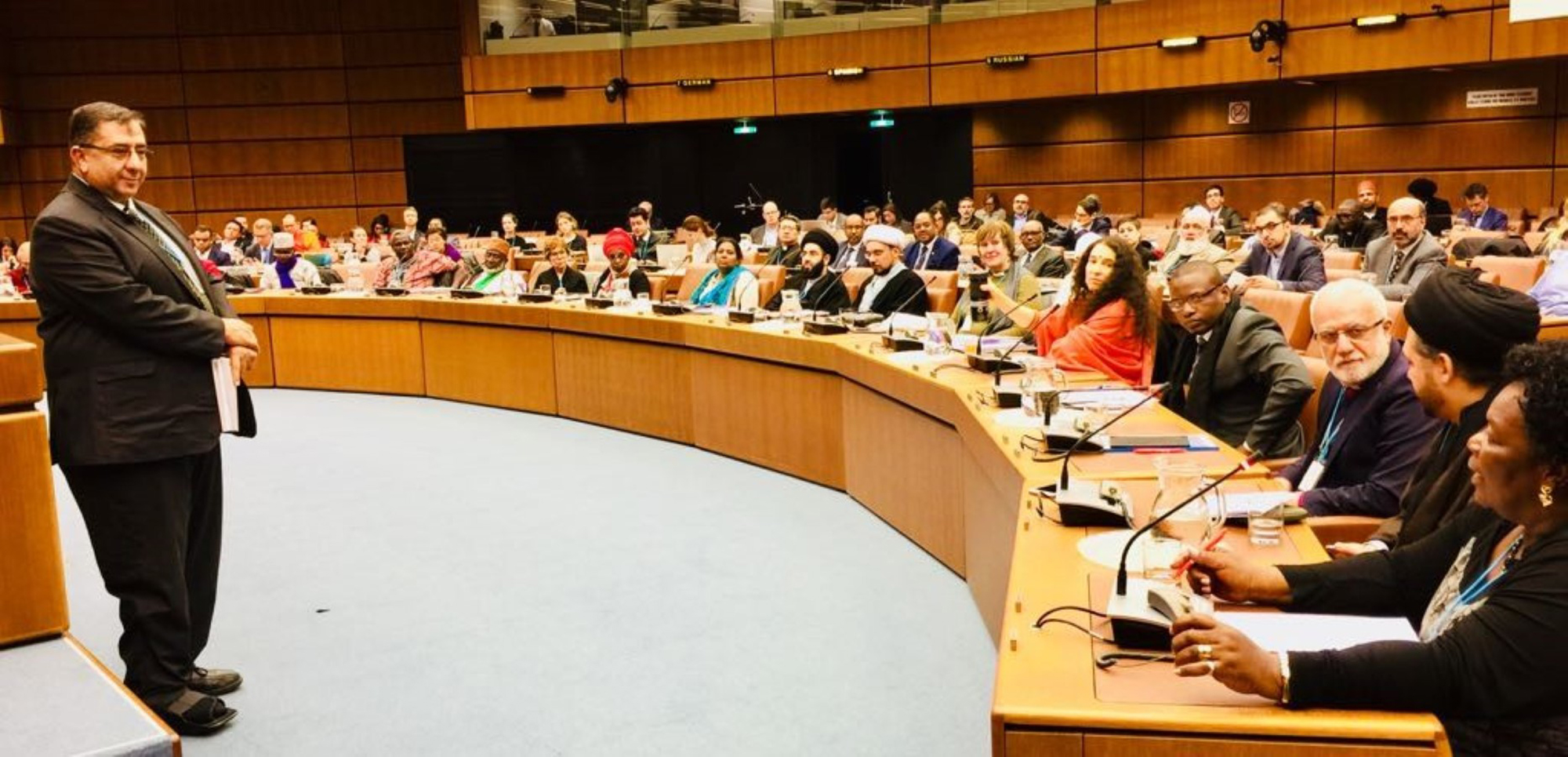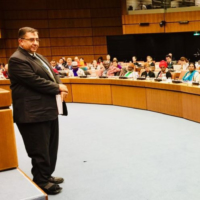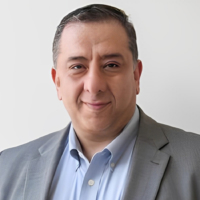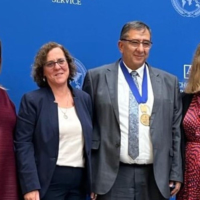The 41st Niwano Peace Prize will be awarded to Palestinian-American professor Mohammed Abu-Nimer, in recognition of his lifelong dedication to peace and interfaith dialogue. As both a scholar and practitioner, he has demonstrated this commitment from his youth to the present day.
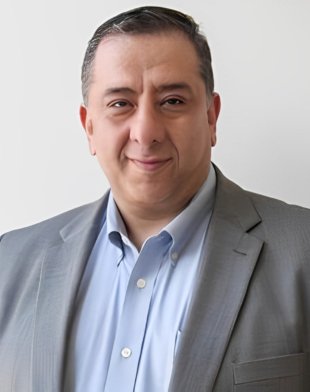
Members of the Niwano Peace Prize Committee responsible for selecting this year’s recipient note what is most impressive about his work is his holistic contribution to peace. This contribution integrates education with conflict resolution and peace-building activities, particularly through his profound understanding of forgiveness and reconciliation in Islam and the way he applies it in practice.
Considering the ongoing conflict in and around the Gaza Strip, the committee said there could not be a more fitting recipient for this year’s prize.
To avoid undue emphasis on any religion or region, every year the Niwano Peace Foundation solicits nominations from people of recognized intellectual and religious stature around the world. In the nomination process, hundreds of designated nominators and organizations are asked to propose candidates. Nominees are rigorously screened by the committee, which presently consists of nine religious leaders from diverse geographical areas, all of whom are involved in movements for peace and interreligious cooperation. The presentation ceremony will take place in Tokyo on May 14. Abu-Nimer will receive an award certificate, medal and ¥20 million.
Peace, interfaith dialogue
Abu-Nimer is a professor of peace and conflict resolution at American University and the founder of the Salam Institute for Peace and Justice in Washington, D.C. The institute is a nonprofit for research, education and practice on issues related to conflict resolution, nonviolence, human rights and development, with a focus on bridging differences between Muslims and non-Muslim communities.
Committee member Flaminia Giovanelli said that what is most impressive is his holistic contribution to peace, which combines the practice of conflict resolution and peace building with teaching.
His teaching is of two kinds, Giovanelli said. The first is of an academic and theoretical nature, focused on learning peace building at American University and other institutions. He engages in a second, more practical type of teaching aimed at resolving conflicts — including through the instrument of development — at various institutes that he has established or helped to establish around the world. These include the Salam Institute for Peace and Justice in the U.S., the Peacebuilding and Development Institute at American University, Conflict Resolution Resource Center at Guilford College in Greensboro, North Carolina, and the Mindanao Peacebuilding Institute Foundation in the Philippines.
Abu-Nimer’s dedication to peace, rooted in his Muslim faith and Sufi teachings, serves as a source of inspiration for his work, reflecting the religious values instilled within his family.
For over 60 years, his grandfather and uncle were the imams of his hometown, an interfaith village in Galilee, Israel, where Muslims lived alongside Christians and Druze. Abu-Nimer has always been convinced that Islam offers a robust framework within which to promote peace, building on values integral to the faith, such as forgiveness, “which liberates the soul,” and reconciliation. “Nonviolence itself,” he said, “is part of theology, and the concept of mercy is the basis of Islam since mercy is one of the names of God.”
Reconciliation, nonviolence
Since 1993, Abu-Nimer has significantly contributed to the exploration of Islamic principles, including reconciliation, forgiveness and nonviolence, thereby advancing the theological understanding of Islam’s stance on peace.
Abu-Nimer’s personal and professional journey begins with the circumstances and place of his birth in 1962 in Galilee, a region with a storied history of religious and ethnic volatility. He pursued his undergraduate and graduate studies at the Hebrew University in Jerusalem and earned his doctorate at George Mason University in the United States, after he immigrated to the U.S. in 1989.
Abu-Nimer has effectively and constructively used his international experience and upbringing to champion the rights and dignity of every man and woman from all ethnic and religious backgrounds through a holistic methodology and a vision for change that links head, heart, hand and spiritual identity. His roles as a negotiator, mediator and peace builder have made it possible for him to engage in conflict resolution worldwide. He began his peace-building journey in 1982, shortly after the Wahat al-Salam/Neve Shalom (meaning Oasis of Peace Village in Arabic and Hebrew) was founded near Jerusalem. His training in dialogue facilitation mainly focused on teaching how to get Arab and Jewish youths to talk to each other.
From the early 1990s, Abu-Nimer worked on Catholic-Protestant relations in Northern Ireland and Buddhist-Hindu relations in Sri Lanka, where, during the civil war, he supported and advised the launching of the Muslim Peace Secretariat and the Peacebuilding and Development Institute Sri Lanka.
Between 1999 and 2005, he served as an advisor to the leaders of various Islamic separatist groups and the Office of the Peace Process in Mindanao.
Between 1993 and 1999, Abu-Nimer conducted most of the conflict resolution and peace-building training for civil society and faith-based organizations in the Arab region for the Search for Common Ground program. As part of these efforts, he helped establish the first conflict resolution and community mediation center in Gaza in 1996.
Interreligious projects
Abu-Nimer has also shown his dedication to peace and dialogue in Africa. During conflicts in Darfur, Niger, Chad, the Central African Republic and Nigeria, he worked with religious leaders to counter violence committed in the name of religion. Through the Salam Institute, and between 2008 and 2016, he led a major initiative to train teachers and students in Islamic religious schools in Niger, Chad and Cameroon.
Already a full professor at the School of International Service at American University and director of the Peacebuilding and Development Institute, Abu-Nimer was designated as the inaugural Abdul Aziz Said Chair in International Peace and Conflict Resolution at SIS in 2023.
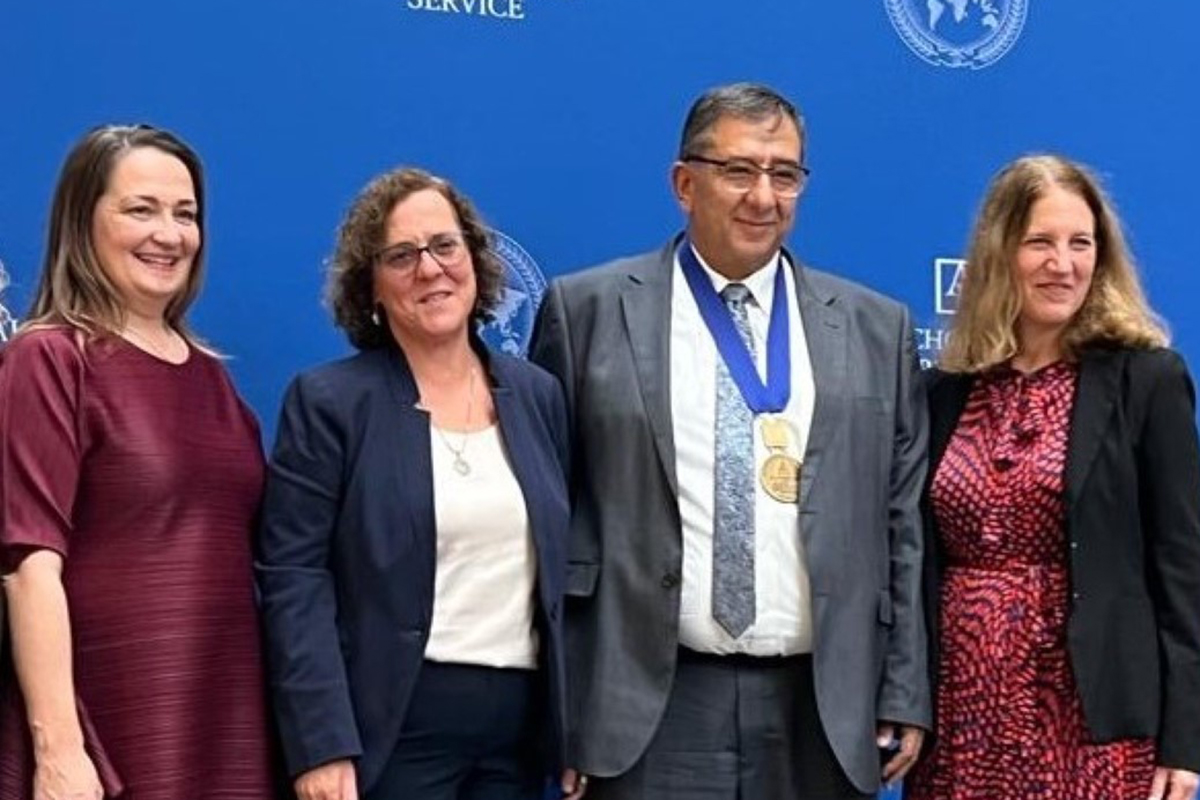
In addition to his scholarly career, Abu-Nimer has initiated numerous projects at the King Abdullah Center of Intercultural and Interreligious Dialogue. He also acted as senior adviser for eight years at this important facility — the first intergovernmental organization dedicated to interreligious and intercultural dialogue — and as a board member has participated in the nongovernmental organization Nonviolence International for the past 28 years.
Abu-Nimer has authored, edited and co-edited over 17 books on faith-based and interfaith peace building. His diverse impact stems from his ability to engage effectively on multiple levels — first at the grassroots, second with structures and institutions, including educational institutions, and third at the policy level.
Niwano Peace Prize recognizes individuals and organizations contributing to interreligious unity
Niwano Peace Foundation established the Niwano Peace Prize to honor and encourage individuals and organizations that have contributed significantly to interreligious cooperation, thereby furthering the cause of world peace, and to make their achievements known as widely as possible.
The Foundation hopes in this way both to enhance interreligious understanding and cooperation and to encourage the emergence of still more persons devoted to working for world peace.
The prize is named in honor of the founder and first president of the lay Buddhist organization Rissho Kosei-kai, Nikkyo Niwano. For Niwano, peace was not merely an absence of conflict among nations, but a dynamic harmony in the inner lives of people as well as in our communities, nations and the world.
Niwano Peace Prize recipients
2023 Rajagopal P. V.
2022 Michael Lapsley
2021 Shih Chao-hwei
2020 Pomnyun
2019 John Paul Lederach
2018 Adyan Foundation
2017 Munib A. Younan
2016 Centre for Peace Building and Reconciliation
2015 Esther Abimiku Ibanga
2014 Dena Merriam
2013 Gunnar Stalsett
2012 Rosalina Tuyuc Velasquez
2011 Sulak Sivaraksa
2010 Ela Ramesh Bhatt
2009 Gideon Baguma Byamugisha
2008 Prince El Hassan bin Talal
2007 Cheng Yen
2006 Rabbis for Human Rights
2005 Hans Kung
2004 The Acholi Religious Leaders’ Peace Initiative
2003 Priscilla Elworthy
2002 Samuel Ruiz Garcia
2001 Elias Chacour
2000 Kang Won-yong
1999 The Community of Sant’Egidio
1998 Maha Ghosananda
1997 The Corrymeela Community
1996 Marii K. Hasegawa
1995 M. Aram
1994 Paulo Evaristo Arns
1993 Neve Shalom/Wahat al-Salam
1992 A.T. Ariyaratne
1991 Hildegard Goss-Mayr
1990 Norman Cousins
1989 Etai Yamada
1987 The World Muslim Congress
1986 Philip A. Potter
1985 Zhao Puchu
1984 Homer A. Jack
1983 Helder P. Camara



